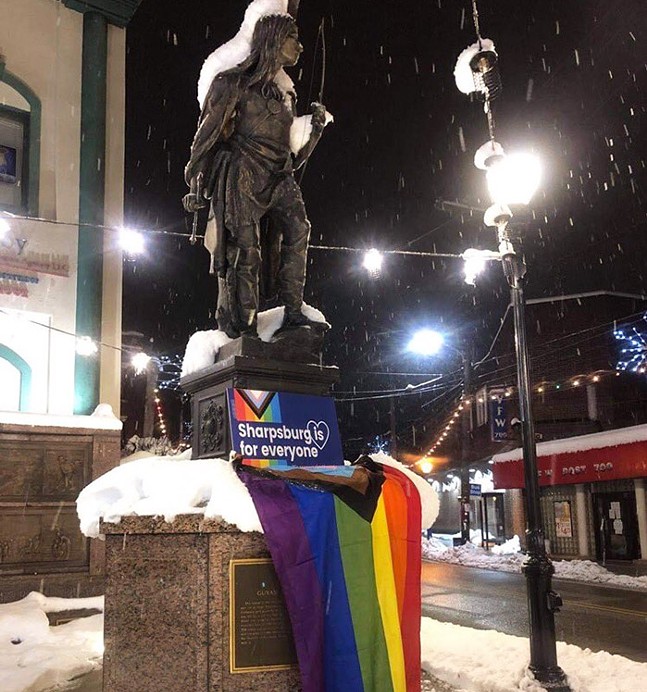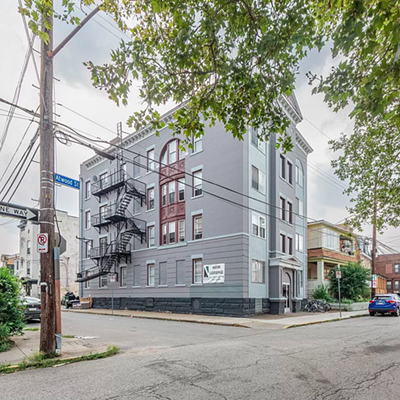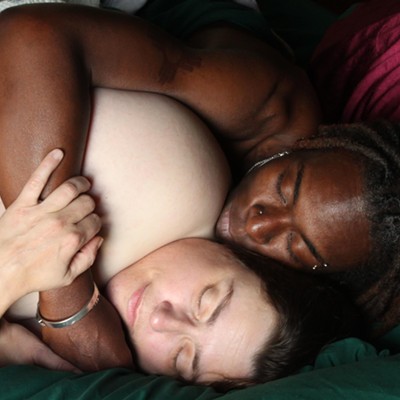OP-ED: Sharpsburg Human Rights Ordinance was more contentious than it appears
This was never a story about passing an ordinance. If it were, then the last several months might make sense. It might make sense that an informed borough council worked hard to craft a meaningful Human Rights Ordinance that would protect, not only LGBTQIA citizens, but citizens of every race, color, religion, national origin, age, disability, marital status, familial status, and veteran status. It might make sense that they carefully considered the opinions of their solicitor and collaborated to get it right.
Yes, that story would make sense. But those of us who’ve been paying attention for the last few months, and who have seen the video record of the council meetings since the ordinance was introduced, know differently. I live in Sharpsburg with my wife and three kids. When I learned of the ordinance, I listened to previous discussions and attempted to understand the reasons it wasn’t yet passed. As a resident and attorney, this ordinance was important. As a member of the LGBTQIA community, this felt personal.
So what is the story? An ordinance was introduced with the full support of three councilpersons, the Mayor, local businesses, landlords, and overwhelming support from residents, was advertised, and failed to pass after months of discussion, during which, the four “no” voters offered no meaningful feedback or alternative drafts. That can’t be right, can it? I should also mention that public officials, attorneys, LGBTQIA policy organizations, and people in Allegheny County all wrote letters of support. How could an ordinance with so much support and practically zero risk for the Borough not pass?
The positions of the “no” voters are clear from the recorded Zoom meetings, which are publicly available on the Borough website. You can watch the evolution of excuses ranging from “we don’t need this kind of law, just pass a resolution,” “we don’t have quality people to serve on a commission,” “we shouldn’t tell landlords who they can rent to,” to “we want to pass an ordinance, but the words aren't right.”
Watch the videos and see Councilperson Joe Simbari state his support for all people, but then openly mock the LGBTQIA community because he doesn’t know what “all those letters mean.” You can listen as Councilperson Gregory Domian suggests that having Black friends means you can’t be racist. You can hear Councilperson Adrianne Laing, who introduced the ordinance, ask for specific feedback from the “no” voters and receive very few comments on what would make them vote yes. The only substantive comment was from Councilperson Domian who requested that a “friendly” letter be sent to any accused parties. It took four months to suggest changes that were so incredibly insubstantial that they didn't even legally change the document. Why? Because this was never about phantom legal concerns or finding magic words. This was about the discomfort that comes with recognizing change and the self actualization required for true leadership.
There is a difference between intention and impact. Elected officials have to be accountable for both. The four “no” votes said they felt attacked after voting down the ordinance and made lengthy statements after the ordinance passed to that effect. Accountability feels like an attack when you are not willing to accept how your actions harm other people. And yes, their actions were hurtful. And no, the people who called you out for your votes were not “throwing a tantrum,” Councilperson Simbari. That you would insult and take umbrage at the community members who spoke out is unforgivable and won’t be forgotten.
I believe in respecting our elders and appreciating the wisdom of those who walked these streets long before me. However, it is everyone’s responsibility to recognize the potential for growth and progress. Passing a law that helps all people enjoy basic protections is not a radical idea. It isn’t even a political idea. It’s a way to preserve the principles that some people claim have always been true. So, why was there so much contention? Why were there accusations of division? Watch the videos and decide for yourself.
This isn’t a story about how an ordinance was finally passed. It is about how a community demanded more of their elected leaders and refused to accept the status quo. It’s about how three progressive Councilmembers understand that we can no longer accept the institutions of racism and heteronormativity. As a community, we can no longer live in a world of alternative facts and revisionist history. We have to open our eyes, become engaged, and hold our leaders accountable when they make choices that do not support equality, equity, and inclusion. The people of Sharpsburg and the surrounding communities rose to that challenge. Sharpsburg is for everyone. Even if it always had been, now we have an ordinance to make sure that it always will be. That is the real story.
Yes, that story would make sense. But those of us who’ve been paying attention for the last few months, and who have seen the video record of the council meetings since the ordinance was introduced, know differently. I live in Sharpsburg with my wife and three kids. When I learned of the ordinance, I listened to previous discussions and attempted to understand the reasons it wasn’t yet passed. As a resident and attorney, this ordinance was important. As a member of the LGBTQIA community, this felt personal.
So what is the story? An ordinance was introduced with the full support of three councilpersons, the Mayor, local businesses, landlords, and overwhelming support from residents, was advertised, and failed to pass after months of discussion, during which, the four “no” voters offered no meaningful feedback or alternative drafts. That can’t be right, can it? I should also mention that public officials, attorneys, LGBTQIA policy organizations, and people in Allegheny County all wrote letters of support. How could an ordinance with so much support and practically zero risk for the Borough not pass?
The positions of the “no” voters are clear from the recorded Zoom meetings, which are publicly available on the Borough website. You can watch the evolution of excuses ranging from “we don’t need this kind of law, just pass a resolution,” “we don’t have quality people to serve on a commission,” “we shouldn’t tell landlords who they can rent to,” to “we want to pass an ordinance, but the words aren't right.”
Watch the videos and see Councilperson Joe Simbari state his support for all people, but then openly mock the LGBTQIA community because he doesn’t know what “all those letters mean.” You can listen as Councilperson Gregory Domian suggests that having Black friends means you can’t be racist. You can hear Councilperson Adrianne Laing, who introduced the ordinance, ask for specific feedback from the “no” voters and receive very few comments on what would make them vote yes. The only substantive comment was from Councilperson Domian who requested that a “friendly” letter be sent to any accused parties. It took four months to suggest changes that were so incredibly insubstantial that they didn't even legally change the document. Why? Because this was never about phantom legal concerns or finding magic words. This was about the discomfort that comes with recognizing change and the self actualization required for true leadership.
There is a difference between intention and impact. Elected officials have to be accountable for both. The four “no” votes said they felt attacked after voting down the ordinance and made lengthy statements after the ordinance passed to that effect. Accountability feels like an attack when you are not willing to accept how your actions harm other people. And yes, their actions were hurtful. And no, the people who called you out for your votes were not “throwing a tantrum,” Councilperson Simbari. That you would insult and take umbrage at the community members who spoke out is unforgivable and won’t be forgotten.
I believe in respecting our elders and appreciating the wisdom of those who walked these streets long before me. However, it is everyone’s responsibility to recognize the potential for growth and progress. Passing a law that helps all people enjoy basic protections is not a radical idea. It isn’t even a political idea. It’s a way to preserve the principles that some people claim have always been true. So, why was there so much contention? Why were there accusations of division? Watch the videos and decide for yourself.
This isn’t a story about how an ordinance was finally passed. It is about how a community demanded more of their elected leaders and refused to accept the status quo. It’s about how three progressive Councilmembers understand that we can no longer accept the institutions of racism and heteronormativity. As a community, we can no longer live in a world of alternative facts and revisionist history. We have to open our eyes, become engaged, and hold our leaders accountable when they make choices that do not support equality, equity, and inclusion. The people of Sharpsburg and the surrounding communities rose to that challenge. Sharpsburg is for everyone. Even if it always had been, now we have an ordinance to make sure that it always will be. That is the real story.

















